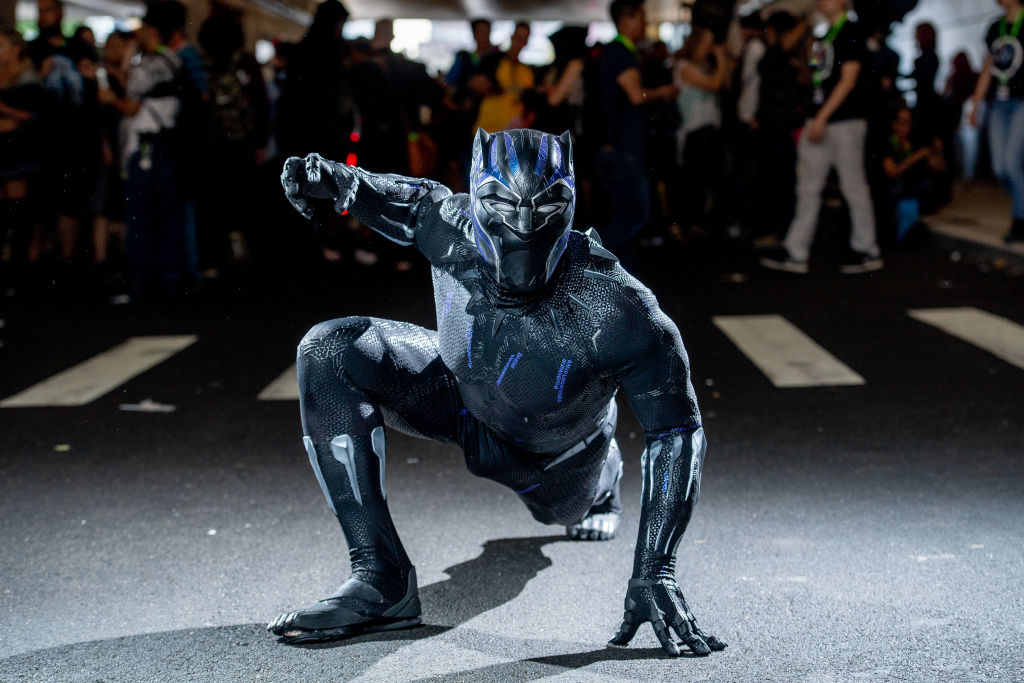Source: Roy Rochlin / Getty
A casual look at the last year of superhero films reveals that the genre is in desperate need of revitalization. Outside of Guardians of the Galaxy Vol. 3 and Spider-Man: Across the Spider-Verse, it was the weakest year for the genre since the first Avengers took the box office by storm. From The Flash, Ant-Man and the Wasp: Quantumania, Blue Beetle (which high key banged), Aquaman and the Lost Kingdom, and The Marvels, superhero films flopped left and right. As a result of both the middling financial returns and the prolonged effects of the dual Writer’s Guild and SAG-AFTRA strikes, both Marvel and DC have used this year to recalibrate their plans for their franchises. With the DC universe set to relaunch next year, and Marvel in desperate need of change, I’m hoping that one of the changes we see is better treatment for their Black superheroes.
To be completely fair, Marvel has done a fairly decent job with its heroes of color. We have Ryan Coogler’s phenomenal Black Panther series, they’ve got the upcoming Blade with the always great Mahershala Ali, Anthony Mackie is the new Captain America, and they’ve made great strides with Ms. Marvel and Echo. Yet, many of the Black heroes are often there as sidekicks for the white leads. While Sam Wilson is now Captain America, he started as Cap’s sidekick. War Machine started as Iron Man’s buddy, and Monica Rambeau stays helping white women in both WandaVision and The Marvels. There’s nothing wrong with helping white women, mind you, I just wanna see her do more.
Like many of DC’s films, their approach to representation has been a mess. While Zack Snyder’s Justice League ostensibly makes Cyborg (Ray Fisher) the protagonist, the cut that was released to theaters in 2017 removed all that nuance for what was ultimately two hours of nothing interesting happening. Jurnee Smollett was fantastic as Black Canary in the criminally underrated Birds of Prey, Yahya Abdul-Mateen was great as Black Manta, and Idris Elba held it down as Bloodshot in The Suicide Squad. Yet, across the 10 years of the now defunct DCEU, we never got a Black superhero like Jon Stewart/Green Lantern or Mr. Terrific take the main stage.
I’m hoping that as DC reboots next year with James Gunn’s Superman: Legacy we see more of these characters finally receiving their big screen glow-up. I know Gunn’s an avid comics fan, and I am begging for him to greenlight an adaptation of N.K Jemisin’s phenomenal comic book Far Sector. The book introduced Sojourner “Jo” Mullein, a Green Lantern assigned to one of the furthest sectors of known space. If you haven’t read it, do yourself a favor and cop it. You can thank me later, no worries.
While, on paper, Marvel is doing a better job at representation than DC, I’m gonna need more out of them than just the Black Panther movies. While those films are fantastic, thematically rich adventures anchored by strong performances, the rest of it just feels performative.
Simply putting a Black character on screen isn’t enough to move me. Apologies to The Little Mermaid, but I will probably never watch you. Some of the moments in these recent shows and movies just feel like Keenan Ivory Wayans is about to pop into the frame and yell “Message!” I don’t think “wokeness” is killing superhero movies like many of the basement dwellers on YouTube would want you to believe. It’s unfortunate that the increased representation has come as the quality of storytelling has decreased in these films. We’ve become the easy scapegoat for why these films are bad, which is why I want not only more Black superheroes but also more complexity from these characters.
I’m an avid comics reader and while representation hasn’t always been great for Black heroes, I’ve appreciated the added complexity in recent years. Both the original and relaunched run of Milestone Comics featured predominantly Black heroes such as Icon, Rocket, and Static Shock. The joy of those books is that they didn’t simply leave it at “Hey look, it’s a Blackity Black superhero book.” They engage with themes of police brutality, white privilege, corporate maleficence, and environmental racism in ways that are nuanced and complicated. The heroes didn’t simply say whatever buzzwords that would get them empty praise. Sometimes they’re on the wrong side of things. They may not always be the most “positive” portrayals, but they’re the most honest.
The 2019 Watchmen limited series is the closet mainstream superhero storytelling has come to matching the complexity of the comics. Anchored by commanding performances from Regina King and Yahya Abdul-Mateen, Watchmen is both a transgressive and searing indictment of racism, power, politics, and the horrific ways they’re all interlinked throughout America’s history. Like Black Panther, it used the genre to say something about the world we live in. We need more of that.
When Black people decide to show up, we show up. Look at the box office success of Black Panther. One of the easiest ways Hollywood can turn its superhero luck around isn’t just increasing the representation, but telling engaging, complex, and most importantly, entertaining stories about the world we live in with characters who look like the audience watching it.
SEE ALSO:
Why Are Young Black Americans So Apathetic About Electoral Politics?
The Black Leader: Exploring The Complexities Of Black Leadership In America
The post Why We Need More Black Superheroes On The Big Screen appeared first on NewsOne.
The post Why We Need More Black Superheroes On The Big Screen appeared first on Black America Web.

